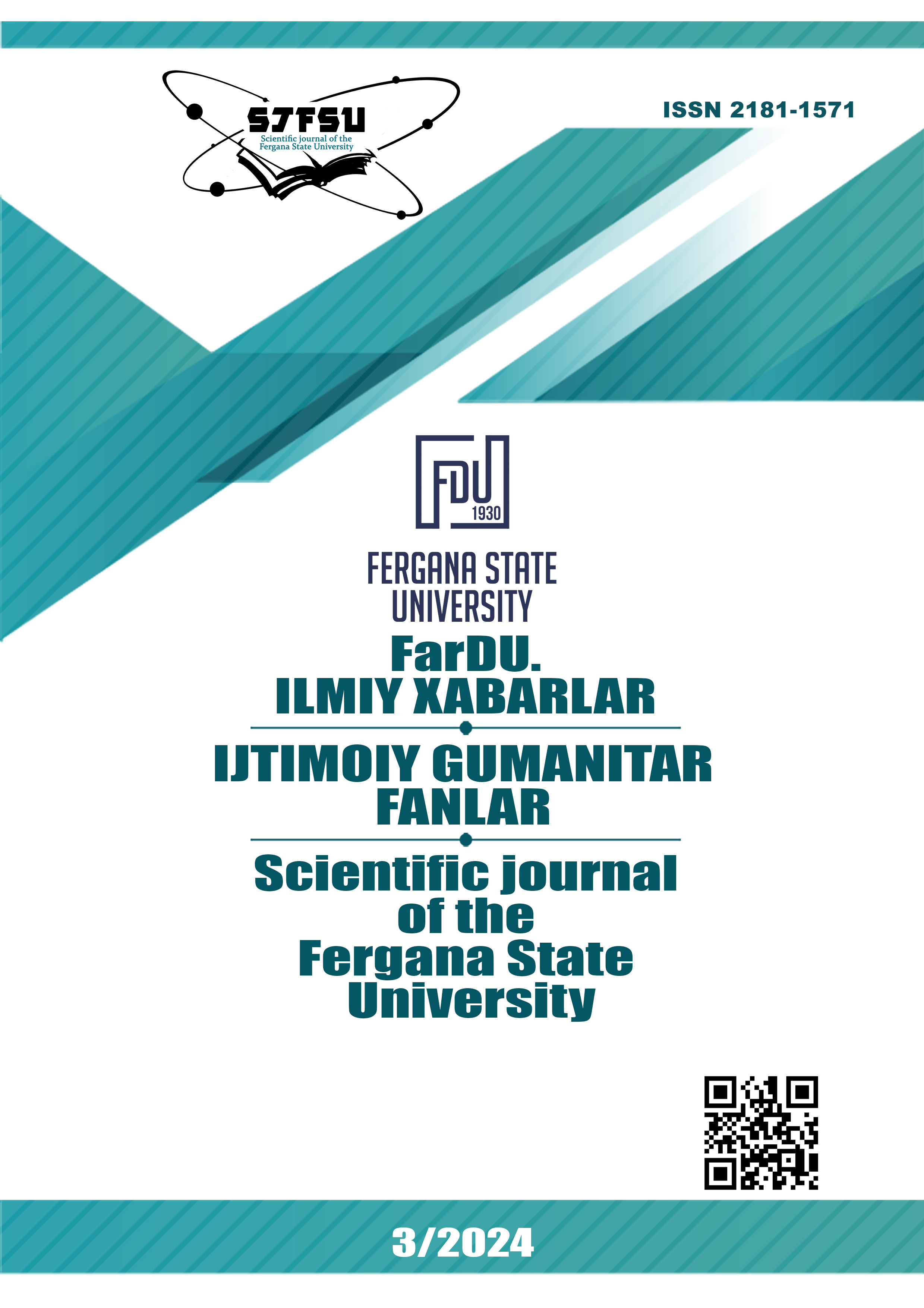HIGHLIGHTING THE TECHNOLOGY OF DEVELOPING ANALYTICAL THINKING AMONG FUTURE TEACHERS IN FOREIGN STUDIES
Keywords:
thinking, analytical thinking, independent thinking, judgment, conclusion, theory, information, methodological requirements, effectiveness of education and training, innovative method.Abstract
In this article, the authors analyzed the coverage of the technology of developing analytical thinking among future teachers in the research of foreign scientists, revealed the essence of the concept of analytical thinking and its specificity on a scientific and theoretical basis. At the same time, trends in the development of analytical thinking, strengthening intellectual potential, increasing the spiritual and ideological immunity of future teachers, and consolidating information skills are revealed. The article substantiates the importance of the formation of analytical thinking among future teachers, analyzes the current state of the development of analytical thinking in modern higher educational institutions, as well as the possibilities and ways of solving problems to eliminate shortcomings. The technologies and models developed by research scientists from foreign countries for the development of analytical thinking are considered in detail, and their significance and relevance are assessed. The formation and comparison of analytical thinking occurs only in practical activities. Listening to recommendations and instructions on the formation of analytical thinking, listening to lectures, the student does not acquire such an ability. Real academic qualifications are formed in practice. The use of interactive methods in the formation and development of analytical thinking among students is becoming important. Preparing students for analytical activities plays an important role in achieving harmony between external and internal factors. The "PRBL“ model of Indonesian researchers teaches students how to create a need for analytical activity and effectively implement this process. Achieving harmony between the content of the model and the stages of its implementation ensures the effectiveness of preparing students for analytical activities.
References
Ivanov.P.I. Umumiy psixologiya.T.:1962.-492-b.
G‘oziev E.Tafakkur psixologiyasi. Toshkent.: O‘qituvchi.-1990. –B. 25. 6
Falsafa. Qomusiy lug‘at.T.: Sharq.-2004
O‘zbekiston Respublikasi Prezidenti Sh.M.Mirziyoyevning “O‘zbekiston Respublikasi oliy ta‘lim tizimini 2030 yilgacha rivojlantirish konsepsiyasini tasdiqlash to‘g‘risida”gi PF-5847-son Farmoni. -T.; 2019 yil 8 oktyabr. Manba: Qonun hujjatlari ma‘lumotlari milliy bazasi, 09.10.2019 y., 06/19/5847/3887-son; 30.04.2020 y., 06/20/5987/0521-son; Qonun hujjatlari ma‘lumotlari milliy bazasi, 09.11.2021 y., 06/21/3/1037-son, 18.03.2022 y., 06/22/89/0227-son.
Mirqosimova, M.M. (2020) Talabalarda analitik tafakkurni rivojlantirish texnologiyasi.// NamDU ilmiy axborotnomasi - Научный вестник НамГУ 2020 yil 4-son. –B. 479.
Mirqosimova, M.M. (2020) Talabalarda analitik tafakkurni rivojlantirish texnologiyasi. Scientific Bulletin of Namangan State University: Vol. 2 : Iss. 4 , Article 89. Available at: https://uzjournals.edu.uz/namdu/vol2/iss4/89
Shonazarov Q.R. Bo‘lajak tarix o‘qituvchilarini maktab o‘quvchilarida tarixiy tafakkurni shakllantirishga tayyorlash. Ped.fan. nomzodi. dis.-T,:2003
Xodjaev B.X. Umumta‘lim maktabi o‘quvchilarida tarixiy tafakkurni modernizatsiyalashgan didaktik ta‘minot vositasida rivojlantirish. Ped. fan.doktori dis.-T,:2016
Hasanov Sh. Аdabiy ta‘lim jarayonida talabalarda analitik tafakkurni rivojlantirish texnologiyasini takomillashtirish. Falsafa(PhD) dok. dis.-N,:2020.
Suyatman1, Sulistyo Saputro2, Widha Sunarno3 and Sukarmin3 The Conceptual Framework for Problem and Research-Based Learning (PRBL) Model in Learning The Natural Sciences to Empower Students' Analytical Thinking Skills https://iopscience.iop.org/journal/1742-6596
Donald J. Bolger, Allyson P. Mackey, Min Wang and Elena L. GrigorenkoThe Role and Sources of Individual Differences in Critical-Analytic Thinking: a Capsule OverviewEducational Psychology Review
Vol. 26, No. 4, Special Issue: Seeking Common Ground: A Multidisciplinary Examination of Critical-Analytic Thinking in Learning and Development (December 2014), pp. 495-518 (24 pages)
Downloads
Published
Issue
Section
License
Copyright (c) 2024 Scientific journal of the Fergana State University

This work is licensed under a Creative Commons Attribution-NonCommercial-NoDerivatives 4.0 International License.
How to Cite
Most read articles by the same author(s)
- , , METHODS OF TEACHING COOPERATIVE ACTIVITIES , Scientific journal of the Fergana State University: No. 2 (2023): Scientific journal of the Fergana State University (Social humanities sciences)

